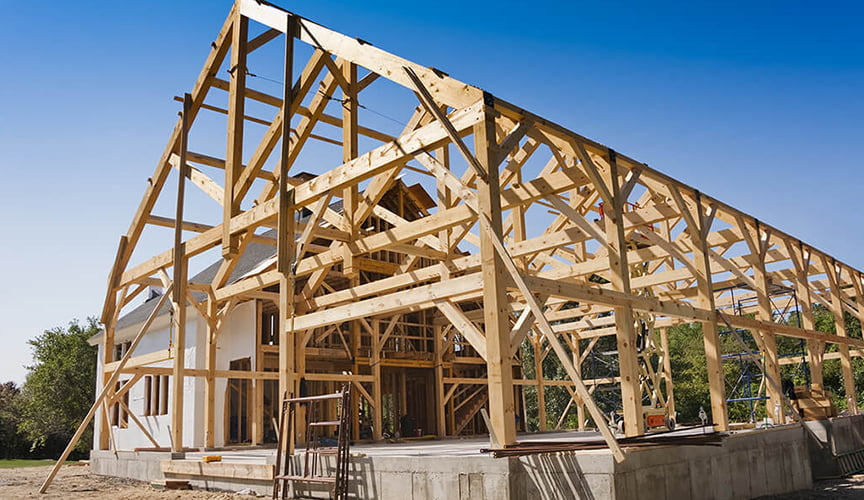
Timber frame construction is a method of building structures using wooden frames and panels. It is one of the oldest and most widely used forms of construction in the world. It offers many benefits, such as durability, flexibility, aesthetics, and sustainability.
In this blog post, we will explore the history, types, and major applications of timber frame construction so you can understand the significance of relying on a reliable timber framing construction company.
Types Of Timber Frame Construction
There are different types of timber frame construction, depending on the method and material used.
Some of the most common types are:
Post And Beam
This is the simplest and oldest form of timber frame construction. It involves using vertical posts and horizontal beams to create a rigid frame. The spaces between the frame members are filled with non-structural materials, such as bricks, stones, or plaster.
Post and beam construction is strong, easy, and economical, but it requires large and heavy timbers, which may be scarce or expensive in some regions.
Platform Timber Frame
This is the most popular and modern form of timber frame construction. It involves using smaller and lighter timbers to create a series of horizontal platforms, which are stacked on top of each other to form the walls and floors.
The platforms are connected by nails, screws, or metal connectors. Platform frame construction is fast, efficient, and adaptable, but it requires more materials, labor, and quality control than post and beam construction.
Balloon Timber Frame
This is a variation of platform frame construction. It involves using long and continuous timbers to create the vertical studs, which span from the foundation to the roof. The horizontal members are attached to the studs at each floor level.
Balloon frame construction is lighter, cheaper, and more fire-resistant than platform frame construction, but it is less stable, more prone to shrinkage, and more difficult to insulate than platform frame construction.
Panelized Frame
This is a prefabricated form of timber frame construction. It involves using factory-made panels, which consist of timber frames and insulation materials, to create the walls, floors, and roofs.
The panels are transported to the site and assembled by cranes or workers. Panelized frame construction is quick, precise, and energy-efficient, but it requires more planning, coordination, and transportation than other types of timber frame construction.
Popular Examples Of Timber Frames
Timber frame construction can be found in various regions and cultures around the world. Some examples of timber frame buildings are:
- The Forbidden City: This is a complex of palaces and temples in Beijing, China. It was built between the 15th and 18th centuries using post and beam construction. It is the largest and best-preserved wooden structure in the world.
- The Eiffel Tower: This is a landmark and monument in Paris, France. It was built in 1889 using platform frame construction. It is the tallest and most visited timber frame structure in the world.
- The Empire State Building: This is a skyscraper and office building in New York, USA. It was built in 1931 using balloon frame construction. It was the tallest and most iconic timber frame building in the world until 1972.
- The Eden Project: This is a botanical garden and educational center in Cornwall, UK. It was built in 2001 using panelized frame construction. It is the largest and most innovative timber frame structure in the world.
Applications Of Timber Frame Construction
Timber frame construction can be used for various purposes and functions, such as:
Residential Buildings
Timber frame construction can provide comfortable, affordable, and customizable homes for different needs and preferences. Timber frame homes can be designed to suit various climates, terrains, and styles. They can also be easily modified, extended, or renovated over time.
Commercial Buildings
Timber frame construction can offer functional, attractive, and sustainable workplaces for different sectors and industries. Timber frame buildings can be adapted to various sizes, shapes, and functions. They can also enhance the productivity, well-being, and image of the occupants and users.
Public Buildings
Timber frame construction can create impressive, durable, and versatile facilities for different purposes and audiences. Timber frame buildings can be used for education, health, culture, recreation, and more. They can also showcase the history, identity, and values of the communities and societies.
Benefits Of Timber Frame Construction
Timber frame construction can also bring many benefits to the environment, economy, and society, such as:
Environmental Benefits
Timber frame construction can reduce the carbon footprint, energy consumption, and waste generation of the building industry. Timber is a renewable, recyclable, and biodegradable material which can store carbon and offset greenhouse gas emissions.
Moreover, it can also improve the thermal performance, air quality, and acoustic comfort of the indoor environment.
Economic Benefits
Timber frame construction can lower the cost, time, and risk of the building process. Timber is a readily available, affordable, and versatile material which can be easily processed, transported, and assembled. Ultimately, timber frame buildings can also increase the value, efficiency, and competitiveness of the building market.
Social Benefits
Timber frame construction can enhance the health, safety, and satisfaction of the building users and workers. Timber is a natural, organic, and aesthetic material which can create a warm, cozy, and inviting atmosphere. Moreover, timber frame buildings can also foster the creativity, collaboration, and innovation of the building design and delivery.
Overall, timber frame construction is a remarkable and resilient form of construction, which has a long and rich history and a bright and promising future. Timber frame construction can offer a wide range of options, benefits, and opportunities for the building industry and society.
How Can We Help?
HighPeak Timber Framing is a reputable timber framing contractor that offers a wide range of framing services. We ensure high-quality timber framing services through the experience and expertise of our qualified team.
Moreover, we use modern technologies and state-of-the-art engineering practices to fulfill the framing requirements of all types of residential and commercial properties. If you want to learn more about our services, contact us!